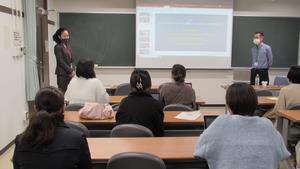- Global Collaboration Center
- Activity
- Report on the 21st SDGs (Sustainable Development Goals) Seminar “From the Field of International Cooperation: Cooperation in Education and Health Sectors at JICA and UNICEF" (Dec.2022)
ページの本文です。
Report on the 21st SDGs (Sustainable Development Goals) Seminar “From the Field of International Cooperation: Cooperation in Education and Health Sectors at JICA and UNICEF" (Dec.2022)
2023年4月14日更新

Lecturer Me. Michio Kojima
On Tuesday, December 6, 2022, Mr. Michio Kojima, an international cooperation expert, an executive director of NGO “Think Locally Act Globally (TLAG)”, and adjunct lecturer at Kanazawa University, led the 21st SDGs Seminar entitled "From the Field of International Cooperation: Cooperation in Education and Health Sectors at JICA and UNICEF." In the seminar, Mr. Kojima gave an in-depth presentation on international cooperation, including his own experience as a student.
Mr. Kojima has been active in international cooperation through JICA (Japan International Cooperation Agency) and UNICEF (United Nations Children's Fund), but as a law student in university, he had no interest in international cooperation despite his interest in international affairs. But his sense of helplessness while volunteering to help rebuild after the Great Hanshin-Awaji Earthquake, and the gap that "people in developing countries seem happy and content despite their poverty" while doing "on the ground" activities such as work camp with Filipino student and an international exchange project in Nepal as a student, led him to pursue a career in international cooperation.
After graduating from university, Mr. Kojima entered graduate school in the United States. Despite struggling with English, he continued studying international cooperation and spent a busy time as an intern at UNESCO in Jakarta, Indonesia. Later, as a JOCV (Japan Overseas Cooperation Volunteer) of JICA, he was involved in educational assistance in Guatemala, Central America. He worked there to train elementary school teachers in mathematics and to establish and improve libraries. He said that the difficulty of communicating in Spanish was a significant obstacle for him throughout his work.
After working in Guatemala, Mr. Kojima was sent to Honduras in Central America by JICA as an international cooperation specialist. There, he participated in a project to combat Chagas disease, which affects only the poorest people and the most impoverished areas. In Honduras, he also faced language barriers. He had to communicate with various stakeholders, including locals and other international aid organizations. In addition, as a JICA expert, he also had to be able to prepare reports in Japanese.
After completing his work as a JICA expert, he became a JPO and worked in Indonesia for two years as an Education Officer for UNICEF. In order to support children who are struggling to learn in a limited environment, he worked on the Early Childhood Development Program (ECD), a community-based pre-school education program in underprivileged areas that addresses the issue of school dropout, which is a particular problem in Indonesia. In Papua Province, which is one of the least developed provinces in Indonesia, he was also involved in EFA (Education for All in Papua Province), which aims to provide a good education to "all children". During the earthquake disaster in Indonesia, he contributed to various projects, including helping to rebuild local primary schools that were damaged. Through his work with UNICEF, his spouse has helped him think more deeply about whether he wants to continue working for the United Nations, what his strengths are, and what he really wants to do. Feeling that "while it is important to help developing countries, it is time for me to face Japan as a Japanese person," he became a member of the Regional Development Cooperation Volunteers in Tateyama City, Toyama Prefecture, where he worked for three years to revitalize a depopulated area. Now he has founded a general incorporated association, TLAG, based in Hokuriku region, which is engaged in community building through nativism between the local regions of Japan and developing countries, and international cooperation from a local perspective.
Mr. Kojima, who has worked in the "field" in a number of places both in Japan and abroad, has come to two crucial conclusions. One is that even if you can't do something by yourself, you can do it by connecting with someone else. The second is that the international is a collection of the local. The local elements of a region are the focus of international cooperation, but we can only find out the local-specific aspects from an international perspective, so the two are intimately intertwined. Rather than focusing on one or the other, we need to consider both when thinking about international cooperation.
It is not easy to have different "experiences" like Mr. Kojima, but there are definitely many lessons to be learned from these "experiences.” “When you are a student, have the power of empathy and experience, rather than think by the brain,” Mr. Kojima advises. Based on his advice, I want to experience many problems and challenges during my university years.
(Momona Murakami, sophomore student, Department of Liberal Arts and Humanities, Faculty of Letters and Education)











